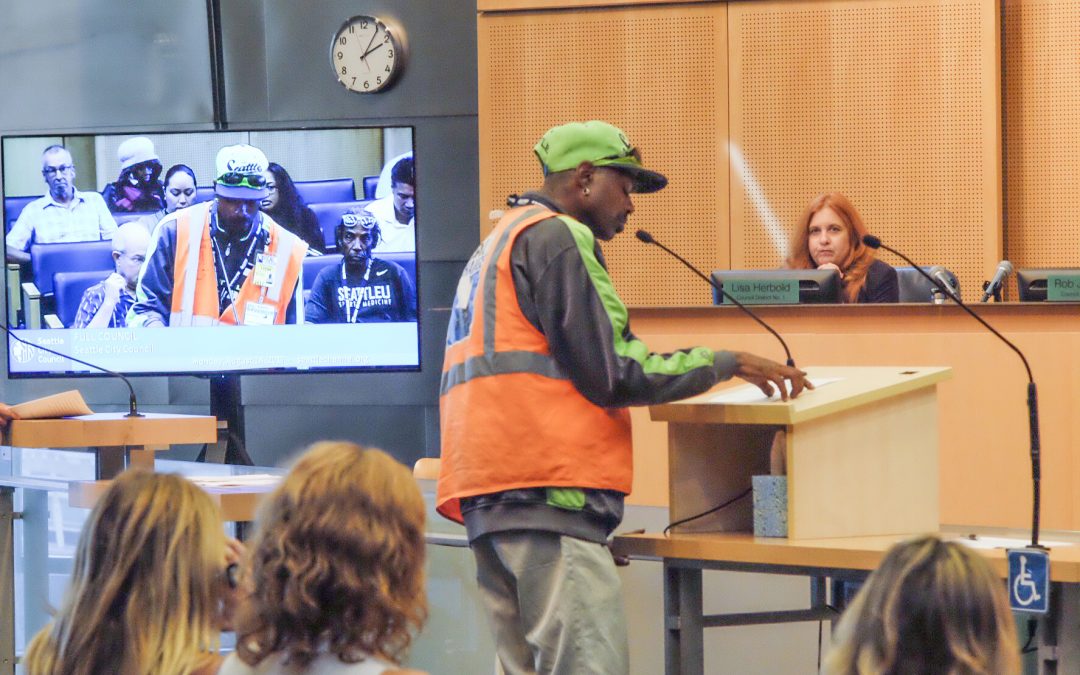The Seattle City Council voted today to reduce barriers to rental housing for thousands of Seattle residents and recognized that criminal background checks for housing are counterproductive and discriminatory. Councilmembers voted unanimously to pass the Fair Chance Housing Ordinance, which addresses some of the collateral consequences of mass incarceration, including racial discrimination and homelessness. The move is a long time coming for groups like Village of Hope and Sojourner Place (now Jubilee Women’s Center), who first raised the issue in 2006. Pending Seattle Mayor Ed Murray’s signature, the law reflects the most progressive housing policy for people with criminal records of any major city in the country.
The City’s original policy proposal, following recommendations made by a stakeholder group initiated by the Housing Affordability and Livability Agenda (HALA), would have allowed the continued use of criminal background checks by landlords for convictions less than two years old. But the Fair and Accessible Renting for Everyone (FARE) Coalition, made up of people impacted by criminal records and advocacy groups, argued that if no evidence exists to support the use of background checks in tenant screening, then even a two-year “lookback period” is inappropriate and discriminatory. The bill that passed today included an amendment that will end the use of criminal records in tenant screening entirely, and another that removes an exemption for owner-occupied buildings with four or fewer units.
The FARE Coalition knows that the criminal justice system discriminates against communities of color, womxn, LGBTQIA+ people, and people with disabilities. Denying an individual housing because of their criminal record extends that discrimination into housing and disproportionately impacts those same groups, especially communities of color.
“The Fair Chance Housing Ordinance corrects an historic injustice,” said Pamela Stearns, chair of the King County Native American Leadership Council and member of the FARE Coalition. “The City infamously kicked out Native Americans at its founding, set fire to the longhouses, and made living opportunities almost impossible for its original inhabitants. Natives have continued to almost live in the shadows, and our community members are disproportionately represented in the criminal justice system. The Ordinance gives our people hope and the opportunity to secure housing in the City that bears the name of one of our greatest leaders.” The benefits of this new law are not limited to those directly impacted.
“Stable housing ensures people can engage with their communities and families, access job programs, and maintain employment,” said Nick Straley, attorney with the Institutions Project at Columbia Legal Services (CLS). “When landlords are allowed to reconvict people who have served their time, the larger community suffers.” The idea that landlords should not be given the rights of judge and jury, especially for a person who has already paid their dues, was a theme of the FARE Coalition’s campaign and also raised concerns with the Councilmembers.
“I have always deserved housing. I did my time,” said Sue Mason, founder of What’s Next Washington and member of FARE. “When this bill passed, I cried tears of joy for all of the people who will never have to endure setback after setback like I have. I can finally unpin the scarlet letter I have worn every time I tried to rent a place to live for 14 years, and just be me. Today is a new day in Seattle.”
Given that nearly one third of adults have an arrest or conviction record, stories like Mason’s are common. The lack of evidence linking criminal records to successful tenancy – as highlighted through research by Merf Ehman, CLS Executive Director, and Anna Reosti – was a major selling point, as was the abundant evidence showing that public safety is improved when people are housed.
“Throughout our city we see residents struggling to access housing and communities, especially communities of color, facing displacement,” said Hana Alicic of the Tenants Union and lead organizer for FARE. “These are the same messages groups like Village of Hope and Sojourner Place were shouting nearly a decade ago. We are grateful now to Lisa Herbold and the rest of Council for hearing these stories and setting an example for the rest of the country.”
In 2015, impacted individuals and local organizations that advocate for affordable housing and the rights of people involved in the criminal justice system created the Fair Accessible Rentals for Everyone (FARE) Coalition to advocate for these changes. FARE includes CLS, Tenants Union of Washington, Washington Low Income Housing Alliance, King County Native American Leadership Council, Seattle Women’s Commission, Post-Prison Education Program, Seattle/King County Coalition on Homelessness, and No New Jim Crow Seattle Campaign.

Recent Comments